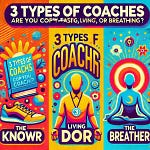If you’ve ever considered becoming a coach or already are one, you’ve probably thought about the merits of one-on-one coaching. It’s the model where you dive deep with an individual client, provide custom-tailored solutions, and have a massive impact. But like any model, it has its upsides and downsides.
Let’s break down the pros, cons, and what makes one-on-one coaching an “all-in” strategy.
The Pros of 1-on-1 Coaching: Why It Works
One-on-one coaching brings several advantages that can transform both your clients’ and your own experiences.
1. Customization
When working with a single client, you can tailor your advice specifically to their needs. Think of it as being a tailor—creating the perfect suit that fits just right. Your ability to adjust your coaching in real-time ensures that your client receives exactly what they need, when they need it.
2. High Impact
There’s no denying that one-on-one coaching leaves a huge mark. You’re dedicating all your energy and attention to one person, and that can create life-changing results. The depth of interaction allows for a higher quality experience, resulting in more profound transformations.
3. High Profit
Let’s not forget the financial side! Because one-on-one coaching provides a high-value, customized experience, you can charge premium rates. It’s the equivalent of being a specialist doctor—clients are willing to pay for the expertise and personal attention they can’t get elsewhere.
4. Personal Touch
When you’re interacting with someone one-on-one, you naturally build a closer bond. You’ll learn about their background, understand their emotions, and establish a deeper connection that goes beyond the surface. This personal touch makes the experience more rewarding for both parties.
5. Accountability
With only two people involved, accountability skyrockets. Your client knows they’re responsible to you, and you’re responsible for helping them reach their goals. There’s no group to hide behind—just two people, a plan, and real results.
6. Breakthroughs
One-on-one coaching allows for frequent “Aha!” moments. Because the interaction is focused, your client is more likely to experience breakthroughs that may not occur in group settings. It's like when a doctor gives you a diagnosis—suddenly, everything makes sense, and the path forward is clear.
The Cons of 1-on-1 Coaching: Where It Falls Short
While one-on-one coaching is great, it’s not without its downsides.
1. Not Scalable
One-on-one coaching is time-consuming. You only have so many hours in a day, which limits the number of clients you can work with. Scaling this model is difficult, and unless you’re charging astronomical rates, your income potential is capped.
2. Requires a Team for Growth
If you want to scale, you’ll need help. This means hiring and training a team of people to provide the same quality of one-on-one coaching, which can be a major headache. Suddenly, you’re not just a coach—you’re a manager, and that’s a different skill set altogether.
3. No Community Building
One-on-one coaching focuses solely on the individual. While this is great for customization, it misses the power of community. Clients in a group or community setting can support each other, which builds camaraderie and shared learning. In one-on-one, it’s just you and the client—no team spirit here.
4. Burnout Risk
Providing high-touch coaching can lead to burnout. When you’re constantly giving 100% to each client, the mental and emotional toll can add up. Trying to scale this model can push you to the edge—resulting in exhaustion and, in extreme cases, burnout.
The Essence of 1-on-1 Coaching: Be a Specialist
The real magic of one-on-one coaching lies in its essence—you’re like a specialist doctor. Clients come to you with their biggest problems, and your job is to diagnose and offer solutions. When done right, the transaction becomes not just a financial one but a transformation. The client walks away not just with advice but with real, tangible outcomes.
One-on-one coaching isn’t for everyone, but if you’re looking to make a deep impact, offer high-ticket services, and don’t mind a bit of burnout risk, it’s worth considering.
Sign-off:
So, the next time you’re thinking about your coaching model, ask yourself: Do you want to be the general practitioner, or do you want to be the specialist? Just make sure you don’t burn out while curing everyone else’s problems!
P.S. If you’re feeling burned out, just remember: even specialists need a day off! 🌴
https://www.youtube.com/channel/UCWE8rbrPAhw7es6GSOYuw5A










Share this post